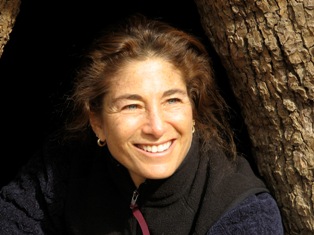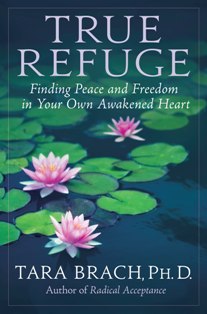
In case you haven't noticed, health care providers rarely treat themselves as compassionately as their patients. The rare provider who practices self-compassion is a living, breathing inspiration. Since I started blogging about women, food and body image two years ago, I've made it a point of interviewing self-compassionate psychologists, among other health and wellness experts, who inspire me to go easier on one and all, myself included.
Until last week, the only psychologist left on my short list was Tara Brach. The beloved psychologist usually needs little introduction, but in case her name is new to you, know that Brach is the author of the heart-opening bestseller Radical Acceptance. A dedicated meditator, she's the founder of the Insight Meditation Community of Washington and the Meditation Teacher Training Institute. She also teaches meditation workshops at Kripalu, Omega Institute and other holistic retreat centers.
As soon as I learned that Brach's long-awaited second book, True Refuge, was coming to a bookstore near me, I tracked her down to chat her up. Actually, I arranged to chat via Skype. By adding audio/video outtakes to the traditional Q&A, my hope is that you, dear reader, will take what I take from most every interview: new perspective, hope and inspiration.
I'm new to Skype, so the first outtake is more audio than video. Live and learn, and be sure to listen to Brach's inspirational take on donuts and other cravings. Click here for that interview outtake.

Q. Let's start with the basics: Define true refuge.
A. True refuge is that which allows us to be at home, at peace, to discover true happiness. The only thing that can give us true refuge is the awareness and love that is intrinsic to who we are. Ultimately, it's our own true nature.
Q. You make a distinction between true and false refuges. Why do you say overeating, shopping and other "addictive" behaviors are false refuges?
A. Because they don't deliver. They're not bad, but they only provide temporary relief. Because [the relief] doesn't last, we have to do these things again and again. Not only that, most of us end up feeling bad about ourselves for taking false refuge, so we end up getting a secondary layer of shame added to it.
Q. You offer lots of inspiration and guidance in your book for dealing with divorce, illness and life's other hardships, but what about everyday distress, like bad body image. How do suggest readers deal with that?
A. The first step is to notice the moments when that is the preoccupation and pause. If you can pause, you can examine what's going on and disrupt the patterning. If you see your body in the mirror and you notice an incessant stream of thoughts about what's wrong, pause, recognize them, feel how much pain and suffering comes up in those moments. The intention is to feel compassion toward yourself so there's less identification with the self that is disgusted with looking bad and more of an inhabiting of the awareness that is observing with kindness.
Q. You write about your own body distress past and present. Tell me about the genetic condition that inspired you to write True Refuge, and how you're dealing with it?

A. Eight years ago, I learned I have the premutation to Fragile X. Fragile X is the leading cause of mental retardation in the world, but the premutation doesn't actually cause mental retardation. My version is my joints don't hold together well, and I injure easily. I was really athletic and outdoorsy, and all of a sudden, I couldn't run, and then I couldn't bike. It was a huge loss. I had to find a refuge that was deep and true enough to help me face the kind of loss that shook me up.
Q. You also divulged that you struggled with binge eating in college. Is that struggle history, or did it resurface with this genetic condition?
A. No, [binge eating] no longer plagues me. [Back then,] I weighed 30 or 40 pounds more than I do now, and I was going from binging to dieting to binging to dieting. A lot of the drivenness fell away when an earlier form of my genetic condition -- a quirky gastrointestinal tract -- [forced me to change] my eating. I feel grateful, because I know how hard it is to struggle with an eating disorder.
Q. What's a simple practice for finding true refuge?
A. Tonglen is simple and beautiful. Quite simply, if you're feeling anxious, angry, a sense of shame, whatever it is, breathe in and agree to touch or feel it. Breathing out, offer space and care to whatever's there. If there's blocking to touching it, emphasize the in-breath and stay embodied. Feel whatever you feel in the throat, the chest, the belly. Or if there's a sense of being possessed by the feeling, emphasize the out-breath. Offer the feeling into a larger field where there's space and kindness. It's an art, not a formula. Ultimately, the practice is to breathe in and feel what's here; breathe out and offer it some space.
Q. Anything else you want to tell me that I didn't ask?
A. Only that the false refuges, the stuff for which we are down on ourselves like overeating, they're absolutely adaptive and well-intentioned.
Are you struggling with an eating disorder or do you know someone who is? Call the National Eating Disorders Association's toll-free helpline for support: (800)-931-2237.
Tara Brach photo by Jonathan Foust
Jean Fain is a Harvard Medical School-affiliated psychotherapist specializing in eating issues, and the author of "The Self-Compassion Diet." For more information, see www.jeanfain.com.
For more by Jean Fain, L.I.C.S.W., M.S.W., click here.
For more on personal health, click here.